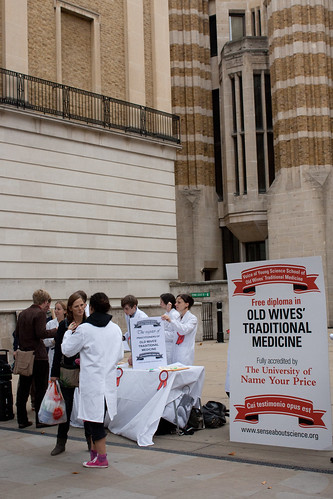This morning, Voice of Young Science stood outside the Department of Health on Whitehall, assessing passers-by and awarding them diplomas in “Traditional Medicine of Old Wives’ Tales”.
The reason for this is a little bit protracted, but bear with me and I’ll explain why they were doing it, and why it is important to take notice. The story started over a year ago when the Department of Health published this document, a consultation on the statutory regulation of a number of Traditional Medicine Systems. This seems to have sent alarm-bells ringing for a number of people, for a number of reasons:
- the proposed registration scheme doesn’t require a practitioner to have any training
- the scheme doesn’t require evidence of efficacy (that the treatments work), merely that they are traditional
- registration from a Government body such as the Department of Health or a subsidiary implies endorsement and legitimises these treatments.
These concerns are found in the Sense about Science submission to the consultation (from October 2009) and in the flyer for today’s event.
It is the first point which VOYS have taken the most issue with: lack of training and the implication that “[traditional] practitioners have the knowledge, skills and attributes of qualified medical practitioners”. This leads on to today’s exploits, which aim to show just how little knowledge is required to proclaim Old Wives’ Tales-type traditional medicine – so little knowledge, that even I got a Diploma:
I’m not entirely sure what the significance of today is, as other than the original consultation, I haven’t been able to find any more on the matter from the Department of Health, not even a response to the consultation. There has also been a little bit of criticism over the choice of “Old Wives'” as the type of traditional medicine portrayed here, as ageist, sexist and failing to take account of historical context, when conventional medicine wasn’t exactly evidence-based. I also think that the way today’s event was done, it looked more about the ease of obtaining a qualification rather than about regulation in traditional medicine.
However, none of these snaggles should stop us from being seriously worried at the point made today though. Regulation and accreditation of alternative medicine only serves to legitimise this sort of pseudoscience and helps it to gain another foothold in society, similar to the platform that traditional medicine courses in universities has provided. We must make every effort to ensure that money isn’t wasted on regulations that could ultimately hinder medical care.


